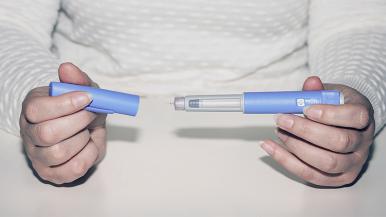Thinking about taking one of the new, trendy weight loss drugs? Getting your hands on them might be difficult — and expensive.
You might’ve heard of drugs like semaglutide (Ozempic and Wegovy), liraglutide (Victoza and Saxenda) or tirzepatide (Mounjaro and Zepbound). Ozempic, Victoza and Mounjaro are labeled for diabetes, while Wegovy, Saxenda and Zepbound are labeled for weight loss.
Wegovy is now indicated to reduce the risk of major cardiovascular events such as death, heart attack, or stroke in adults with known heart disease and with either obesity or overweight. Zepbound is also now approved for treatment of OSA (Obstructive Sleep Apnea) for those with Obesity.
Frances Lee, a nurse practitioner who specializes in weight loss, answers some of the most commonly asked questions about the injectable drugs below.
Will these drugs actually help me lose weight?
These medications are effective for weight loss. Studies tell us patients using the medications can lose up to 20% of their body weight depending on which medication is used and other lifestyle factors.
Medical weight management services are now available via Rush Virtual Specialty Care. Learn more and schedule a virtual appointment today.
The medications are also generally safe to use, but they're also new medications, so we may not have all the answers surrounding long-term use for weight loss.
There are certain patients who we don't recommend the drugs for, including:
- Those who have had medullary thyroid cancer or multiple endocrine neoplasia type 2 (or have had a family member with either)
- Those with a history of pancreatitis or gall stones
- Those with gastroparesis or severe heart burn
- Women planning a pregnancy or women who are pregnant
What do you typically tell patients when they ask about these medications?
We warn patients about the cost of the medication. Many insurance providers won’t approve of the drugs if the purpose of using them is for weight loss and not Type 2 diabetes. Without insurance, the medications can cost up to $1,500 per month, depending on pharmacy pricing.
Insurance may cover alternative weight loss medications, but patients would need to consult with their doctors and insurance providers to figure out what the best path of care would be.
What’s the approval process like for insurers or employers to cover the drugs?
It typically requires the provider to fill out a prior authorization form that the patient’s pharmacy benefits provider would review. You may get an answer back within 24 hours but it’s typically a longer wait.
Is there enough stock of these weight loss drugs to meet the demand?
Supply issues remain intermittently, but are not nearly as significant a concern as previously.
It seems to vary by location and distributor, but some patients have missed a week of medication because of supply issues. When it’s a short delay of around a week, most patients don’t have any problems. But for many others, the delay is too significant or frustrating to keep trying to find the medication, so they decide to stop. Longer delays may require changing the dose of the medication or changing to a different medication altogether. We don’t typically recommend a short-term substitute.
Where are patients hearing about these drugs?
Patients are hearing about the medications from a lot of different places, including social media, internet searches, friends or even other healthcare providers.
These drugs are prescription-only. What should people know to avoid being falling for counterfeit weight loss drugs listed online?
These medications are prescription-only. People who end up buying the non-FDA-approved ones are getting them from compounded pharmacies which might be using different ingredients and a different “recipe” than the FDA-approved “recipe.”
Compounded medications come in a vial that need to be drawn into a syringe. Ozempic, Wegovy and Mounjaro come in the form of an injectable pen. Eli Lilly has a program where some doses of Zepbound are available as a vial/syringe in addition to injection via needle.
What’s your advice for people who might be curious about whether weight loss drugs would work for them and who want to learn more?
Make sure to talk with your primary care provider or a weight loss specialist. Patients can also check their insurance benefits to see if they have coverage for weight loss medications, and if so, which ones.




